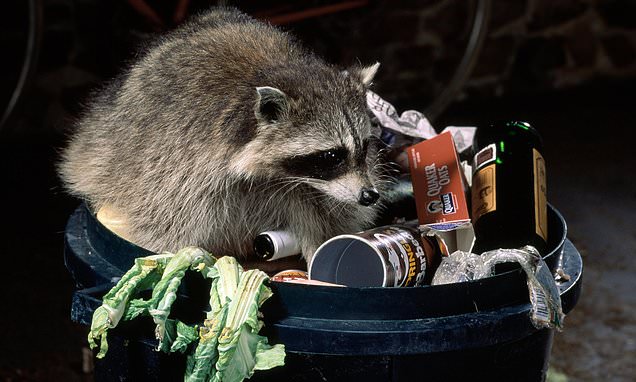They have distinctive black eye-masks and an annoying habit of scavenging in bins.
Now raccoons – which are a common, if unwelcome, sight in their native North America – are poised to set up home in Scotland.
A report commissioned by the country’s wildlife agency has predicted that a breeding population of the animals is likely to become established here.
Experts believe that, within a decade, a sufficient number of the animals will have been deliberately released or escaped from captivity to allow them to establish a presence in the wild and start to thrive.
And while the creatures undoubtedly look cute, ecologists have warned that their arrival will cause havoc.
A raccoon delves into a bin looking for food
As well as munching their way through valuable crops such as soft fruits, the raccoons could also threaten vulnerable species such as seabirds.
Worryingly, they can also carry rabies – a disease which can prove fatal to humans.
After commissioning research, the Scottish Government’s wildlife agency NatureScot has now placed the raccoon on its ‘priority list’ of non-native species which are likely to become more common in the next ten years.
The agency’s invasive species policy manager Stan Whitaker said: ‘Raccoons in Scotland may sound unlikely – but this independent study has highlighted there is a real risk that imported animals or escapees from zoos or private collections could allow a breeding population to develop.
‘Raccoons are generalist predators and can prey on a wide range of native species. Of particular concern is their impact on amphibians, birds and their nests.
‘In North America raccoons can have a severe effect on seabird colonies on coastal islands.
‘They can also carry a range of diseases and parasites of concern to human, livestock and domestic dog health, including roundworms, toxoplasmosis and rabies.’
While originating in the US, the mammals have quickly spread in other countries where they have been introduced.
In Germany, a small number of raccoons were deliberately set free in the 1930s. It is now estimated the country is home to up to a million of the animals.
They have since dispersed and have made it as far west as Spain, south to Italy and east to Poland.
A study published in the Scientific Reports journal found climate change will help the masked invaders spread northward.
In the past decade, only seven raccoons have been photographed or captured in the wild in Scotland.
Mr Whitaker said: ‘Raccoons are good at adapting to new environments and can rapidly reproduce. In the 1970s they entered Japan as pets.
Some were released and they spread throughout Japan.
‘It is highly likely a small number of raccoons could establish a breeding population here too.’
